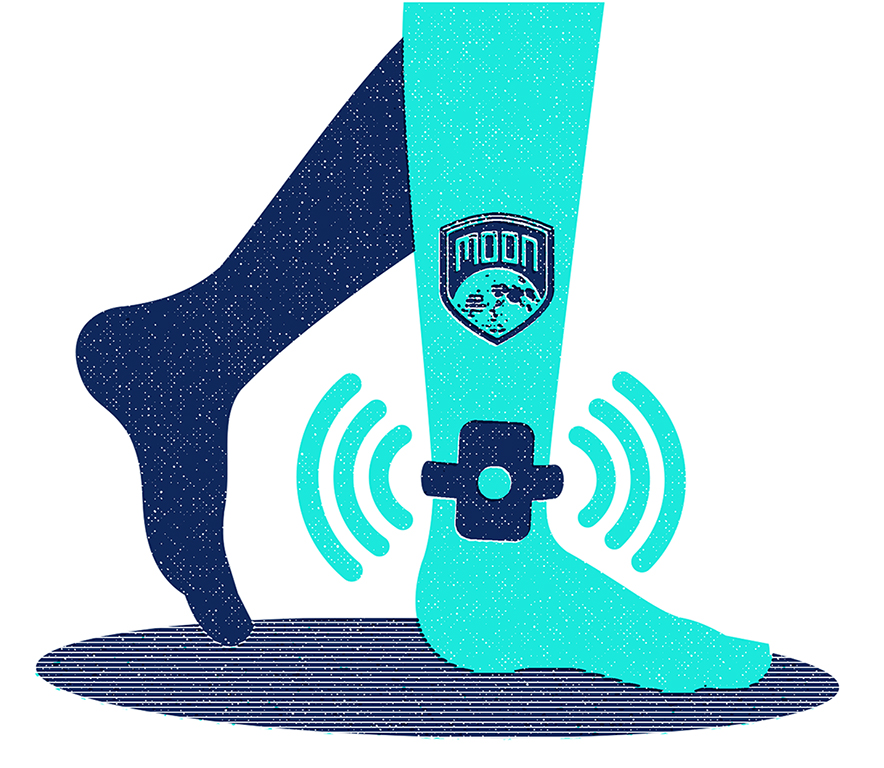Don’t Sweat the Proof: Moon Security Monitors Alcohol Consumption for Courts

The electronic security industry and its related technologies are increasingly being used to provide novel services in a wide variety of scenarios. One such innovation is offered by ESA Member company Moon Security, which provides a unique service to courts in its tri-state area: 24/7 alcohol consumption monitoring. This service saves money, protects the public and improves the well-being of its participants.
Program Benefits
The program benefits the person assigned to monitoring because it is an alternative to their being held in prison while they await trial, and many studies report that the program greatly reduces recidivism. The program also benefits the courts and cities because it reduces the number of prisoners, saving cities money and leaving room for more dangerous offenders to be put behind bars.
“It’s manpower intensive, and it definitely can make money, but you also have to have the contacts for working with courts,” says Mike Miller, president of Moon Security. “That’s a doable thing, I know there’s some other alarm companies that do that.”
Requirements
To be able to provide this service, Miller says the company must have 24/7 monitoring capabilities, a physical security mindset and specially trained staff who can appear in court when the accused contest evidence generated by the program. Building relationships with city officials and court administrators is vital to the implementation of this program as well, according to Miller.
This is because customers for this specific service come to Moon Security when the judge assigns a defendant to the program. Then, the defendant seeks a company that provides the alcohol monitoring service – in this case, Moon Security – and the service provider monitors the defendant and reports any instances when the defendant is out of compliance.
To allow the monitoring party to determine if a defendant complies, he or she wears a connected ankle bracelet that analyzes blood alcohol content (BAC) via transdermal testing. The bracelet communicates constantly with a base station that can transmit information to the monitoring center by ethernet, Wi-Fi, cellular or landline connections.
“What happens is, basically, when you drink, you sweat, and when that sweat comes into the chamber, the unit that's attached to your ankle can analyze it and tell when you started drinking and when [your BAC] goes down as your body burns the alcohol,” says Miller.
“So, we can tell if you’re in compliance or not in compliance with the judge’s orders. Usually, while you’re waiting to go to court, they don’t want you drinking at all.”
Going Against the Grain
If a wearer is out of compliance, Moon Security reports the incident to the court within 24 hours. This report could have consequences for the offender; because of this, many have attempted to challenge the efficacy of the technology to avoid further sentencing. When this happens, the company sends an employee to the court to explain the technology and defend against the challenge.
“There’s always going to be somebody who wants to challenge the court testing of our units. We have a couple people that have gotten their court training from AMS, so they go sit in front of the judge and get grilled by the attorney on either side, and they have to show the engineering and the reporting,” says Miller. “We’ve had several people that were what I’ll call the ‘front line’ that were taking care of the participants, and as they’ve gotten the experience, we’ve put them into the court training program so that allows them to get in front of the judges and the court systems themselves.”
Initiating Services
Moon Security charges fees for the initial setup, daily operation and other expenses required to conduct reporting, according to Miller. Currently, he estimates there are between 400 and 450 actively monitored participants in the alcohol monitoring and house arrest monitoring programs provided by Moon Security in more than 70 court agencies across Washington, Idaho and Oregon.
To promote the company’s services, Moon Security has a strong presence in the court system and routinely attends a few key conferences where employees can interact with judges, court administrators and attorneys to show them the monitoring equipment.
“Our core is security installs, service and monitoring. This [alcohol monitoring program] is just an extra kicker because it allows us to be in front of all these agencies,” says Miller. “We’re starting to see that we need to expand on that and show other services we can provide, not just the house arrest and alcohol monitoring.”
Miller says that through these relationships and the quality service offered through the program, his company hopes to see more municipalities and professionals contact them about additional security services.




